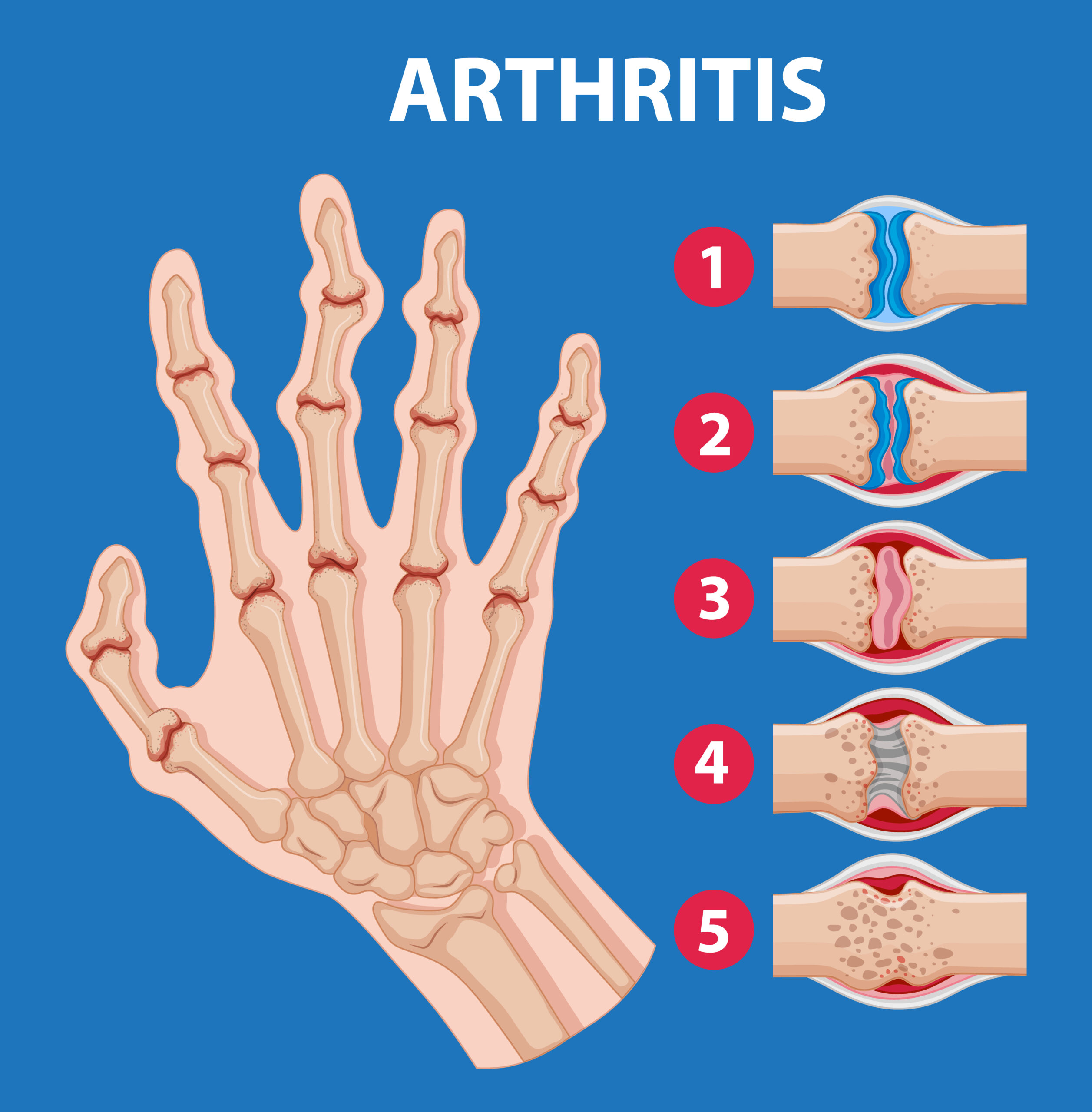Insight Rheumatology – Arthritis affects about one in five adults in the United States, making it one of our most common chronic conditions and our leading cause of disability. Most people experience osteoarthritis, which occurs when the flexible tissues at the end of our bones start to wear down over time, causing pain, aching, stiffness, and swelling. Rheumatoid arthritis and gout, which are two distinct types of arthritis, are also experienced by millions of Americans each year.
Although there is no cure for arthritis and there is much about this disease that we still do not know, there are a number of things we can do to avoid triggers that aggravate our symptoms and live a productive, pain-free life. Whether you have been managing arthritis for many years or have been recently diagnosed, here are six common triggers for arthritis and tips on how to avoid them.

Foods

Certain foods can have a significant impact on arthritis, including the development of symptoms and progression of the disease. Processed foods, sugary drinks, and foods high in saturated fat all cause inflammation. Dairy, red meat, and gluten are also known to trigger arthritis symptoms. Anyone experiencing arthritis should adopt an anti-inflammatory diet filled with fruits, vegetables, whole grains, and fish rich in omega-3 fatty acid. People have also found success with gluten-free and dairy-free diets. If you suspect something you’re eating is causing symptom flare ups, try keeping a food journal to monitor what you are experiencing with certain foods and gain a better understanding of which foods to eliminate from your diet.
Exercise
Physical activity is an important part of a healthy lifestyle, but certain high-impact activities like running or lifting and engaging in repetitive motions could be aggravating your arthritis symptoms. Instead, try incorporating more low-intensity exercises into your routine. This includes biking, swimming, walking, and other activities that are gentle on your joints. It is also crucial for people with arthritis to practice warm up and cool down exercises during all physical activity to prevent joint strain.

Changes in Weather
From changes in barometric pressure to temperature and humidity, weather can impact arthritis in many ways. For example, people with arthritis often experience greater joint stiffness and discomfort during colder weather and an increase in flare ups in humid climates. Although we can’t change the weather, there are a few steps you can take to keep it from affecting you. In the warm, humid months, dehumidifiers and air conditioning are two of the best ways to alleviate joint pain. In colder weather, always remember to keep joints prone to pain (e.g. hands and knees) covered. Heating pads and warm baths are also great options to improve circulation and minimize joint stiffness. It’s also important to always stay moving and hydrated year round to keep your joints flexible.

Out of Control Stress
Have you ever noticed your arthritis pain is worse during stressful moments? This is because stress releases hormones like cortisol and adrenaline, which leads to an increase in inflammation, muscle tension, and sensitivity to pain. To keep stress at bay, make maintaining a healthy lifestyle a priority. This includes eating a balanced diet, getting a good night’s rest, exercising regularly, and avoiding alcohol and smoking. Practicing mindfulness techniques such as meditation and deep breathing are also highly effective ways to stay present and manage stress more effectively.

Excess Weight
Obesity or even being overweight by ten pounds can significantly impact how your body responds to arthritis. Excess weight puts additional stress on weight bearing joints like the knees, which can cause joint degradation and even bone-on-bone friction over time. People who are overweight are also more likely to experience inflammation, muscle weakness, and other chronic diseases that can complicate arthritis management, including diabetes and heart disease. Similar to managing stress, maintaining a healthy lifestyle focused on a balanced diet and regular physical activity are the best ways to support weight loss and maintaining a healthy weight. You may also benefit from the assistance of a dietician or personal trainer to help you reach your goals.

Alcohol and Smoking
Drinking alcohol and smoking both contribute to numerous health issues, including respiratory conditions, heart disease, and cancer. But many people are unaware that it can also greatly impact people with arthritis. Smoking and drinking results in systemic inflammation, which causes greater joint pain, swelling, and stiffness. It can also limit the effectiveness of arthritis medications and impair the immune system’s ability to fight diseases like arthritis. Talk to your doctor about your alcohol and tobacco use. They are a great resource for support and can provide recommendations on counseling or other therapies. Although quitting smoking and alcohol consumption can be difficult, eliminating these habits will help you manage your arthritis effectively and improve your overall quality of life.

Arthritis is a challenging disease that impacts millions of people in different ways, which is why understanding the common triggers that aggravate symptoms and taking proactive steps to avoid them is one of the best options to improve your quality of life. If you think you may have arthritis or are struggling with managing your symptoms, Insight Rheumatology can help! Contact us today to learn more about our services and schedule an appointment with one of our rheumatology specialists.
FAQ
Q: I have joint pain. How do I know if it is arthritis?
A: Most joint pain related to arthritis is accompanied by stiffness and swelling. Joint pain from arthritis is also most common in the morning or during periods of inactivity. If your joint pain symptoms persist, consider visiting a rheumatologist for testing and an acurate diagnosis.
Q: Can younger adults experience arthritis?
A: Yes. Although it is more common in adults over age 50, people of any age can experience arthritis, including children. It is important for people of all ages experiencing joint pain, stiffness, and swelling to seek medical care as soon as possible. Early diagnosis and treatment can prevent long-term joint damage and symptoms.
Q: Does arthritis require surgery?
A: Most people diagnosed with arthritis will not require surgery. However, it may be necessary in cases of severe joint damage or deformity and chronic pain. If surgery may be an option, It is important to always consider the potential risks, benefits, and outcomes with your healthcare provider to determine the best treatment plan for your condition.

